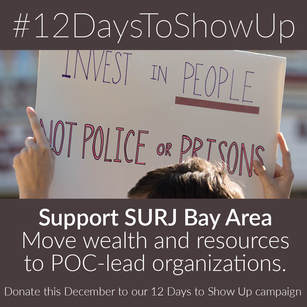|
As a part of SURJ Bay Area’s #12DaysToShowUp Fundraising Campaign — and our ongoing commitment to racial justice and reparations — 50% of all donations raised for SURJ are passed on to local POC-led organizations. The other 50% will be used to fund under-resourced rural SURJ chapters and to support our own work mobilizing white people in the Bay Area. Donate to SURJ Bay Area before December 31 to help us reach our year-end fundraising goal of $20,000. In addition to your donation to SURJ, we encourage you to match donations directly to POC-led organizations like those we’ve featured each of the 12 Days of this campaign. Contributed by Robin Wetherill
Fundraising for SURJ has fundamentally changed the way I think about wealth: about what wealth is, where it comes from, and what it can do. Before I joined SURJ’s Fundraising Committee, I — like, I suspect, many people who are interested in social justice work — had a vague sense that money was wrapped up in all the kinds of hierarchy that I wanted to work against: racism, classism, sexism, homophobia, ableism. Because of that association, in many ways, I saw money as antithetical to radical politics. I have gradually come to see that the opposite is true. Yes, money is intimately bound up with social inequality. That is precisely why social justice movements must seriously engage with questions of wealth and the distribution of resources. This is especially true for white people who want to participate in the movement for racial justice. In 2013, the median wealth of white families was 13 times that of Black families and 10 times that of Latino families. The racial wealth gap is partially attributable to historical practices that prevented non-white households from obtaining, retaining, and investing wealth. For example, post-World War II government programs that made homeownership affordable for working class white families explicitly excluded families of color. And in California, the Alien Land Law of 1913 made it illegal for Asian immigrants to own land or lease it for more than three years. More recently, the financial crisis of the mid-2000s disproportionately devastated communities of color. From 2010-2013, the median wealth of white households fell by 2.4%, while the median wealth of non-Hispanic Black households fell by 33.7%, and the median wealth of Hispanic households declined by 14.3%. One reason for this difference is that Black and Hispanic households were more likely than White households to be targeted by subprime mortgages — even when they should have been eligible for prime credit. Fundraising with SURJ has encouraged me to think more deeply about the ways in which I disproportionately receive wealth. Because of White privilege, I have access to wealth in ways that people of color often don’t. I’m referring here not just to my own personal financial resources, but also to the ways that whiteness makes it easy for me to access spaces, networks, and people who might be out of reach for non-white organizers. This sucks. It is painful to acknowledge the extent of my own privilege and how it shapes my opportunities. When I fail to acknowledge it, though, I abdicate my responsibility to use that access. A choice to ignore my own access to resources is a choice to ignore calls from our partners and allies to engage in the work of reparations. The SURJ Bay Area Fundraising Committee — affectionately known as FunCom — brings what I have come to think of as the “reparations mindset” to our work. The belief in white folks’ affirmative duty to materially support POC-led movements for racial justice is central to this mindset. For every dollar we raise, we commit to pass at least half of that dollar along to a POC-led partner. At least for me, this commitment reflects the principle that this money was never really ours in the first place — it was always already owed to our partners. Similarly, we never set any conditions on the funds we share with partner organizations. We have no right to control the funds because, again, they never really belonged to us. The fight for racial justice requires many things: courage, coordination, perseverance, strength of will, love, and empathy. It also often requires resources. Those resources can bus people to a protest, turn activists out at a city council hearing, buy sign-making materials, rent space for a workshop. I am proud of what FunCom does to make all of those things happen, and committed to continuing this work today — on the biggest fundraising day of the year — in 2018, and beyond. I hope you’ll join me in making a gift to move resources to POC-led organizations today, and moving White people to act ask part of a multiracial majority for justice. Donate to SURJ Bay Area before December 31 to help us reach our year-end fundraising goal of $20,000. Comments are closed.
|
Find articles
All
Browse by date
July 2024
MEDIUM |
© COPYRIGHT 2017-2024 SURJ BAY AREA. ALL RIGHTS RESERVED.



 RSS Feed
RSS Feed